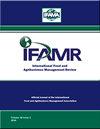How and why did the transition process towards a fully sustainable production of cocoa beans in Bahia (Brazil) take place?
IF 1.5
4区 经济学
Q3 AGRICULTURAL ECONOMICS & POLICY
International Food and Agribusiness Management Review
Pub Date : 2024-03-13
DOI:10.22434/ifamr2023.0049
引用次数: 0
Abstract
This paper theoretically models and empirically assesses the sociotechnical transition process experienced by a group of producers in southern Bahia State (Brazil). Driven by the search for economic sustainability in cocoa production, this group has achieved full sustainability through production chain upgrading, enabling the agroforestry system’s (cabruca) continuity in their properties. In order to understand how and why this process happened, our conceptual model advances on the Multi-Level Perspective (MLP) framework, as it is an applied way of analyzing different niche transformations within the same regime, a typical situation in agrifood systems in emerging markets. Our analyses and empirical evidence suggest that interpersonal relationships play a crucial role in this process, particularly developing concepts and strategies, and in establishing operational structures. Rules and structure formalization may replace interpersonal relationships, as observed when the transition goes forward. Our findings evidence knowledge gathering, cooperation among actors, and information and support exchanging as critical factors to trigger the niche transition process.巴伊亚州(巴西)是如何以及为何向完全可持续的可可豆生产过渡的?
本文对巴西巴伊亚州南部一群生产者所经历的社会技术转型过程进行了理论建模和实证评估。在寻求可可生产的经济可持续性的驱动下,该群体通过生产链升级实现了完全的可持续性,使农林系统(cabruca)在其产业中得以延续。为了了解这一过程是如何发生的以及发生的原因,我们的概念模型采用了多层次视角(MLP)框架,因为它是分析同一制度下不同利基转型的一种应用方法,这也是新兴市场农粮系统中的一种典型情况。我们的分析和经验证据表明,人际关系在这一过程中发挥着至关重要的作用,尤其是在制定概念和战略以及建立运营结构方面。规则和结构的正规化可能会取代人际关系,正如在过渡时期所观察到的那样。我们的研究结果证明,知识收集、参与者之间的合作以及信息和支持交流是触发利基转型过程的关键因素。
本文章由计算机程序翻译,如有差异,请以英文原文为准。
求助全文
约1分钟内获得全文
求助全文
来源期刊

International Food and Agribusiness Management Review
AGRICULTURAL ECONOMICS & POLICY-
CiteScore
2.90
自引率
0.00%
发文量
0
审稿时长
>12 weeks
期刊介绍:
The IFAMR is an internationally recognized catalyst for discussion and inquiry on issues related to the global food and agribusiness system. The journal provides an intellectual meeting place for industry executives, managers, scholars and practitioners interested in the effective management of agribusiness firms and organizations.
IFAMR publishes high quality, peer reviewed, scholarly articles on topics related to the practice of management in the food and agribusiness industry. The Journal provides managers, researchers and teachers a forum where they can publish and acquire research results, new ideas, applications of new knowledge, and discussions of issues important to the worldwide food and agribusiness system. The Review is published electronically on this website.
The core values of the Review are as follows: excellent academic contributions; fast, thorough, and detailed peer reviews; building human capital through the development of good writing skills in scholars and students; broad international representation among authors, editors, and reviewers; a showcase for IFAMA’s unique industry-scholar relationship, and a facilitator of international debate, networking, and research in agribusiness.
The Review welcomes scholarly articles on business, public policy, law and education pertaining to the global food system. Articles may be applied or theoretical, but must relevant to managers or management scholars studies, industry interviews, and book reviews are also welcome.
 求助内容:
求助内容: 应助结果提醒方式:
应助结果提醒方式:


